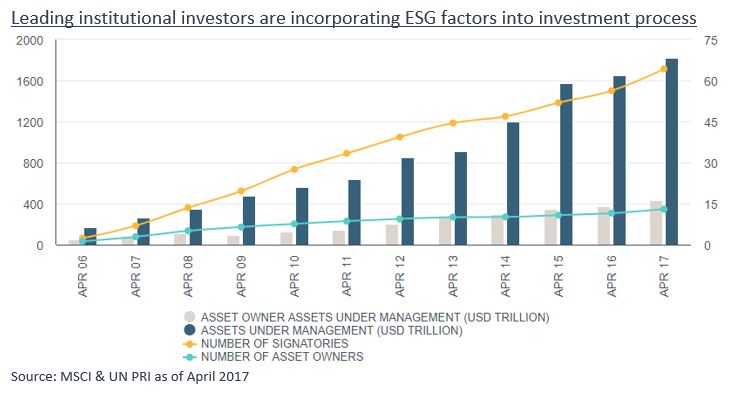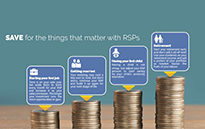What is ESG? Is it an important factor to consider when investing?

ESG is growing in significance amongst both institutional and retail investors. The practice of ESG investing began in the 1960s as socially responsible investing, with investors excluding stocks or entire industries from their portfolios based on business activities such as tobacco production or involvement in the South African apartheid regime.1
Today, ethical considerations and alignment with values remain common motivations of many ESG investors but the field is rapidly growing and evolving, as many investors look to incorporate ESG factors into the investment process alongside traditional financial analysis.1
So, what exactly is ESG?
For many, the term “ESG” brings to mind environmental issues like climate change and resource scarcity. These form an element of ESG–and an important one–but the term means much more. It covers social issues like a company's labor practices, talent management, product safety and data security. It also covers governance matters like board diversity, executive pay and business ethics.2
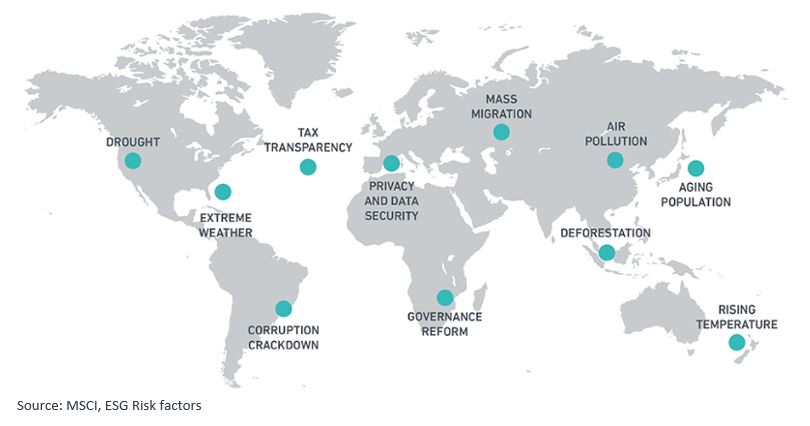
4 reasons why ESG should matter to you as an investor
- “Good” companies enjoy lower funding costs, lower volatility & fewer cases of bribery, corruption and fraud
A common debate with ESG investing revolves around the idea that incorporating ESG factors into the investment process will hurt performance. However, some studies suggest that companies with robust ESG practices displayed a lower cost of capital, lower volatility, and fewer instances of bribery, corruption and fraud over certain time periods.1
Conversely, studies have shown that companies that performed poorly on ESG have had a higher cost of capital, higher volatility due to controversies and other incidences such as spills, labor strikes and fraud, and accounting and other governance irregularities.1
-
ESG controversies can cost investors a lot
The latest ESG analysis by BofA Merrill Lynch (BAML) reveals S&P 500 companies caught up in ESG–related scandals since 2014 paid a large cost – with the controversies resulting in peak–to–trough market capitalization losses of $534bn.3
The analysis included 24 big controversy cases related to data breaches, accounting scandals, sexual harassment and governance issues – including Facebook's privacy breach in 2018, Wells Fargo's accounting misconduct in 2016, and 21st Century Fox's sexual harassment scandal in 2016.3 -
Massive asset growth in ESG strategies
Since its founding in 2006, the United Nations Principles for Responsible Investing (PRI) has attracted support from more than 1,800 signatories representing over USD $68 trillion in assets under management as of April 2017.
Given the explosive asset growth in ESG strategies, ESG funds' positioning will increasingly matter for drawdowns during controversies by being particularly quick in liquidating and/or cutting exposure to stocks involved in ESG–related controversies.3
In addition, many studies suggest that millennials as well as women are more interested in sustainable investing and over the next two to three decades, millennials could put between $15 trillion to $20 trillion into U.S–domiciled ESG funds, equivalent to S&P 500's size today.1 -
ESG could help avoid 90% of bankruptcies
Studies also found that 15 out of 17 bankruptcies in the S&P 500 between 2005 and 2015 involved companies with poor environmental and social scores five years prior to their bankruptcies.3
Covid-19 pandemic could elevate ESG factors
The recent volatility in financial markets due to the coronavirus pandemic has demonstrated on a large scale the importance of other factors that are paramount to ESG investors and could be relevant to a company's long–term performance. Among them: disaster preparedness, business continuity planning and employee treatment through benefits such as paid sick leave as companies get employees to work from home.4
In addition, conversations could also evolve to broader discussions, including topics such as whether telecommuting could reduce a company's carbon footprint, and how corporates response to the pandemic could highlight their ability to adapt to challenges and trends in the societies to address social problems. A good example is car maker, Ford Motor Co. and other companies decision to manufacture medical supplies during this health crisis.4
How are investment managers playing their part in sustainable & responsible investing (SRI)?
Since the founding of the United Nations–supported Principles for Responsible Investment (UN–PRI) in April 2006, many active asset managers and institutional investors such as Allianz Global Investors, Aberdeen Standard Investments, Aviva Investors, just to name a few, have recognised the importance of responsible investing and have committed to ESG best practices by incorporating ESG considerations into their investment process in varying degrees.
For Allianz Global Investors (AGI), they believe that ESG factors are important investment performance drivers which can only be realized fully through a truly active approach to asset management and are committed to integrating ESG factors into all investment decisions across all asset classes on their global investment platform.
As of 30 June 2019, all of Allianz Global Investors' investments are ESG–informed, which means that all their investment professionals have access to proprietary ESG research via a digital collaboration platform and pursue an active stewardship approach to improve business practices and performance of companies. Of which, about 22% of their €535 billion Asset under Management are ESG–integrated, which means that financially material ESG factors are integrated into investment analysis and decision making in a systematic and disciplined way.
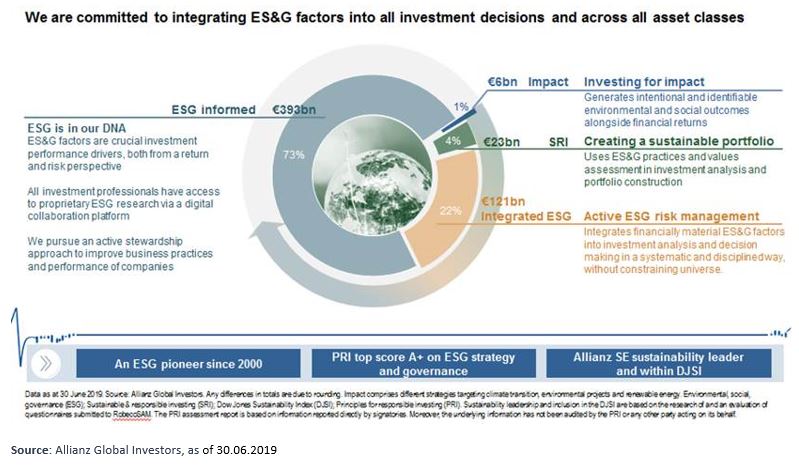
For Aviva Investors, they fully integrate ESG criteria into its bottom–up investment process. An example of this process would be through its Sustainable Income and Growth fund.
Firstly, the bottom 20% of the investable universe by ESG score is excluded completely, regardless of countries and sectors. Secondly, the strategy does not invest in unsustainable sectors such as those in tobacco, coal or controversial weapons. From this defined set of securities, the portfolio is constructed to maximise for sustainability and investment outcomes. As an active manager, Aviva Investors will actively engage these companies to improve their sustainability be it through their social, environmental or governance responsibilities.
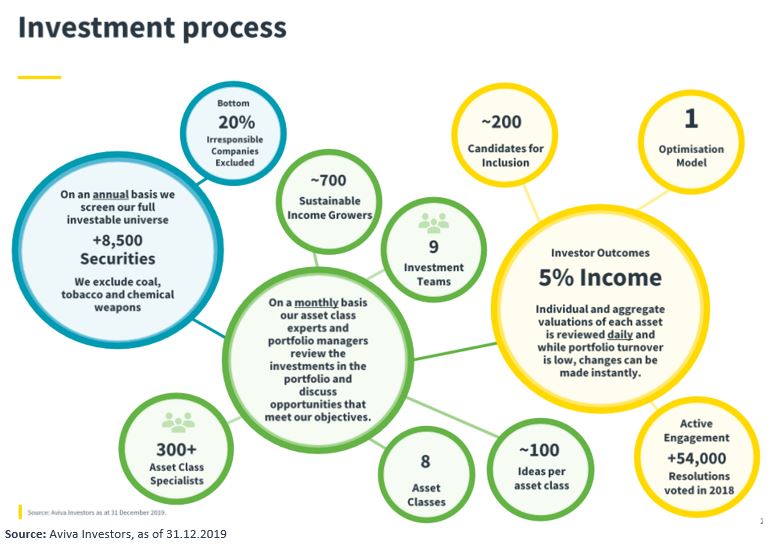
To aid decision–making during the portfolio construction phase, many asset managers also developed proprietary tools to evaluate a company's exposure and management of ESG risks via a quantitative metric, in order to identify investment risk and opportunities within the investment universe. One such example is the “Aviva Heatmap Algorithm” or “AHA” score developed by Aviva Investors. ESG work often goes beyond a tool or quantitative model, but also involves active engagement at a governmental policy level. This role is often filled by a specialist team, and in the case of Aviva Investors, this team is led by the Chief Responsible Investment Officer.
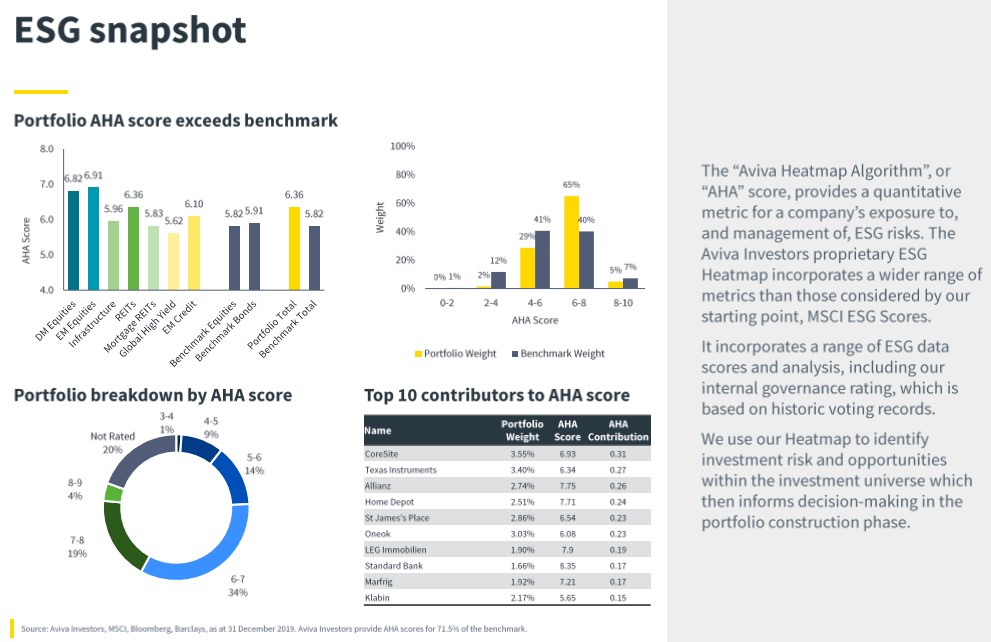
Do funds that prioritize ESG do better than those that don't?

We compared 5 global multi–asset funds along with the LionGlobal Infinity Global Stock Index Fund which tracks the MSCI World Free Index and noticed that the results were rather mixed. The best performer across year–to–date, 6–month and 3–year time frame is the DWS Premier Select Trust, which did not account for ESG factors in its investment process.
However, ESG–integrated strategies such as Schroder Multi–Asset Revolution managed to outperform the global stock index, though one could argue that a multi–asset portfolio should not be compared to a pure equities index, especially during such turbulent times. But this comparison was done just to give us a clearer picture of what ESG means to our investments.
Regardless, although ESG has been gaining much traction over the years, whether it truly matters in the sense of performance enhancement – only time will tell. What we can be sure of is the impact that ESG brings to the greater good of mankind and for our future generations. If we as individual investors hold asset managers accountable for investing–for–good, asset managers, through the billions of investment dollars they invest in corporations will be able to influence and hold companies accountable for being ESG–conscious.
Together, with our small but collective efforts, we can make the world a better place.
Get started by exploring funds on dollarDEX using our intuitive fund finder and start your no–fees investing journey now!
YOU MAY ALSO LIKE
Disclaimer
All information here is for GENERAL INFORMATION only and does not take into account the specific investment objectives, financial situation or needs of any specific person or groups of persons. Prospective investors are advised to read a fund prospectus carefully before applying for any shares/units in unit trusts. The value of the units and the income from them may fall as well as rise. Unit trusts are subject to investment risks, including the possible loss of the principal amount invested. Investors investing in funds denominated in non-local currencies should be aware of the risk of exchange rate fluctuations that may cause a loss of principal. Past performance is not indicative of future performance. dollarDEX is affiliated with Aviva but dollarDEX does not receive any preferential rates for Aviva products as a result of this relationship. Unit trusts are not bank deposits nor are they guaranteed or insured by dollarDEX. Some unit trusts may not be offered to citizens of certain countries such as United States. Information obtained from third party sources have not been verified and we do not represent or warrant its accuracy, correctness or completeness. We bear no responsibility or liability for any error, omission or inaccuracy or for any loss or damage suffered by you or a third party (including indirect, consequential or incidental damages) arising in any way from relying on this information.
This information does not constitute an offer or solicitation of an offer to buy or sell any shares/units.
This article has not been reviewed by the Monetary Authority of Singapore.
Information is correct as of 12/05/2020.

